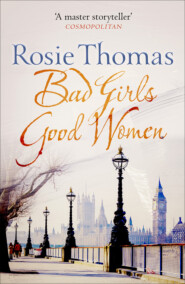По всем вопросам обращайтесь на: info@litportal.ru
(©) 2003-2024.
✖
White
Автор
Год написания книги
2018
Настройки чтения
Размер шрифта
Высота строк
Поля
Suzy smiled, a lovely hazy smile of pure happiness and contentment. ‘Sure I do.’
‘Forget it, pal.’
They eased their way through the crowd to the door. The party was hotting up, in the way that weddings could do.
‘Finch has got to fly home up to Vancouver tonight,’ Suzy explained to the last group.
‘Weather’s turned pretty nasty,’ one of Jim Sutton’s cronies observed.
‘Finch has seen worse,’ Suzy said proudly.
Finch put her arm around her. ‘Go on, go back to your guests. I’ll call you. Have a great honeymoon.’
The newlyweds were going to the Caribbean. Suzy liked beaches.
They kissed each other.
‘Remember what I said. About coming back.’
‘I will,’ Finch promised. ‘Be happy, Mrs Sutton.’
‘I will,’ she echoed. ‘Thanks for being here, Finch. And for everything else, all the times we’ve had. I love you, you know? Plus you were a ripper bridesmaid.’
‘I wouldn’t have missed it. I love you too.’
She blew a last kiss from the doorway. As soon as she stepped outside, the cold and wind hit Finch like an axe blow. She ducked her head and teetered on high heels to the parking lot where she had left the rental car. The moment she was inside it, with the radio tuned in to some rock station and the heater beginning to do its work, Finch pushed her head hard back against the seat rest and let out a yodel of relief.
One more wedding.
She put her foot down and hightailed it for the airport until a twitch from the rear wheels gave warning of how icy the road was. She slowed at once and watched for the glow of tail lamps ahead of her.
At the airport she nosed the car into one of the Alamo slots and dropped the keys and the paperwork into the box at the closed booth at the end of the lot. The wind had strengthened and there were airborne needles of ice in it. Her thin coat over the pale-blue suit was no protection and there was a long hike to the doors of the departure hall. She dropped her bag and crouched to rummage inside it. From the bottom she pulled out her Gore-tex ski parka and pulled it on with a grunt of relief. She’d brought it with her on her three-day trip to Oregon thinking there might be a chance of some hiking, if not cross-country skiing. As it turned out there had been no time at all, but at least the faithful Patagonia was good for something now. Insulated from her hood to the middle of her thighs, Finch put her head back and marched through the wind. She carried her bag hitched over one shoulder and from the other fist trailed Suzy’s wedding bouquet. She had almost left it in the car, but had decided that she could hardly abandon her best friend’s flowers to wither on the passenger seat of a rented Nova.
Inside the sliding doors the warmth was a blessing but the concourse was packed. One glance at the departures board told her the worst and the clerk at the Air Canada desk confirmed it.
‘I’m sorry, ma’am, the airport’s closed. No flights until the weather eases. Tomorrow morning, I’d say.’
Sam McGrath was out running. It was more than a habit, this daily pushing himself through the barriers of disinclination and fatigue to achieve a rhythm and finally the synchrony of muscle and breath and mind that made it all worthwhile. It was a mainstay of his existence. Sometimes, in the blacker moments, he feared it was the only one.
He was skirting the shores of a little lake, and there was ice crusting the dead reeds along the margins and skinning the deeper water. The track wound between trees and bushes with their spring buds blackened by the return of winter; the dirt underfoot was greasy with earlier sleet but Sam knew the route so well that his pace never slackened. He was warm, now, and going at full stretch, his steady breathing making clouds in the bitter air and his footfalls pounding a drumbeat in his head.
He liked this solitude. Mostly his daily running was hemmed in by the city and there were always people within sight.
His father used to bring him fishing for brook trout down here, Sam remembered. Once they had camped somewhere back up in the trees in the old green tent and had fried their catch over a smoky fire. He would have been about ten years old. It must have been some holiday weekend when Michael hadn’t swung it to go climbing.
Memories shivered and stirred in his head.
He was eight years old and standing with his father at the foot of a cliff. The face stretched up so high over Sam’s head that it blotted out the sun. He reached up his hands, palms flat and raised, and rested them against the sandstone. Mike had ceremoniously dusted them with chalk. Particles of grit scraped minutely against his skin. Slowly, tasting nausea in the back of his throat, he lifted his eyes and searched for holds. Then he bent one knee and pressed the tip and side of his sneaker into a crack.
Up.
His fingers bent and hooked. The crevices were too tiny, but still he forced himself to entrust his weight to them. Sweat burst through the skim of chalk dust.
Up.
The grass, sweet and sappy, was a long way beneath him. The rock was close to his face and the air behind and below hummed and expanded, and played tricks with gravity. One minute he was a feather, hardly anchored to the boulder, the next a sack of soaking clothes, too heavy to hold up.
Up one more foothold.
He couldn’t look up or down.
‘Sammy, you’re fine. I’m here to catch you.’
He couldn’t work out if his father’s hands were huge, a great cradle waiting for him, or a tiny cup that he would smash under his weight. He hung on for a moment longer, desperation knocking inside him, then his legs liquefied and his fingers slid from their holds.
He was falling through space. There was a white flash of relief, resignation, before his father’s arms caught him and lifted him at once in a great flourish of triumph and strength and pride, and then they were both laughing in delight, and Michael swung his son through a loop of blue infinity before setting his two feet back on the ground again. He kissed him on the nape of his neck, under the wet curl of his hair.
‘That’s my boy. You’ll climb the Cap before you’re twenty, just like your old man. And then some.’
Sam let him tug his ear and pummel his shoulder, after the kiss, but he knew that he wouldn’t do what his father expected. Wouldn’t, couldn’t, whatever the Cap might be.
Twenty years later, he made himself concentrate on the length of his stride and keeping his breathing even. Running was good for that, always. You could go for miles, lost in your thoughts and memories, if that was what you wanted. And if you didn’t want to think you could edit everything else out of your mind, everything except legs and lungs, and the way ahead.
The track brought him to the tip of the lake, then rose steeply through a belt of Douglas firs to meet the blacktop where it followed the crest of the ridge. With his head up and his breathing still steady even after the hill climb, Sam ran easily along the roadside. One pick-up truck came by, travelling in the opposite direction, but there was no other traffic. It was less than two miles to the turning to his father’s house.
The McGrath place lay back from the road, hunched up against the black trees as if it would disappear among them if it could. The white paint on the window frames was faded to grey and it was peeling in places, and the curtains at three of the four windows were drawn tight, with that dead look of never being opened whatever the time of day. Mike McGrath’s old station wagon stood on a patch of scrubby ground, with Sam’s rental car beside it. Sam had slowed to a walk as soon as he reached the mailbox on its splintered post and the cold wind immediately skewered between his ribs. The sleet had started up again. Sam pulled up the hood of his fleece jacket and skirted the two cars on his way to the door.
His mother used to grow flowers just here. Cosmos and marigolds and goldenrod, he remembered. She loved bright colours. In spite of the cold he loitered deliberately where the margin of her garden used to be, thinking of the way she used to come out here on summer evenings to snap off the heads of fading blooms or pull up tufty clumps of grass from between the clods of earth. The house faced west and the sun would still be colouring the front of it when the woods behind had turned dark.
Sam took one deeper breath. He couldn’t linger out here, he told himself. He would have to go in now and tell him.
He pushed open the front door, putting his shoulder to it because damp had warped it and given it a tendency to stick.
Mike was sitting in his chair, watching daytime TV. There was a pot of coffee on the stove and an unwrapped loaf of pre-sliced bread spilling like a soft pack of cards on the counter. Sam pushed back his hood again as his father looked up at him.
‘Good one?’ the old man asked, without much interest.
‘Yeah. I went along past the Bowmans’ place and round the lake.’
‘Quite a way, then.’
‘Not bad. It’s cold out there.’
‘Coffee’s made.’
‘Thanks.’
Sam poured himself a cup and drank a couple of mouthfuls, remembering not to wince at the taste.











